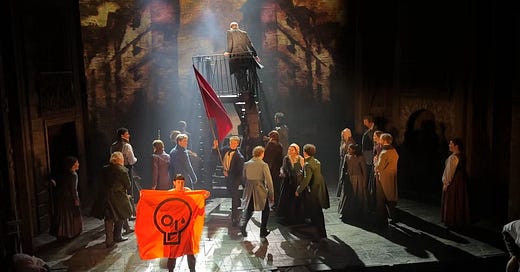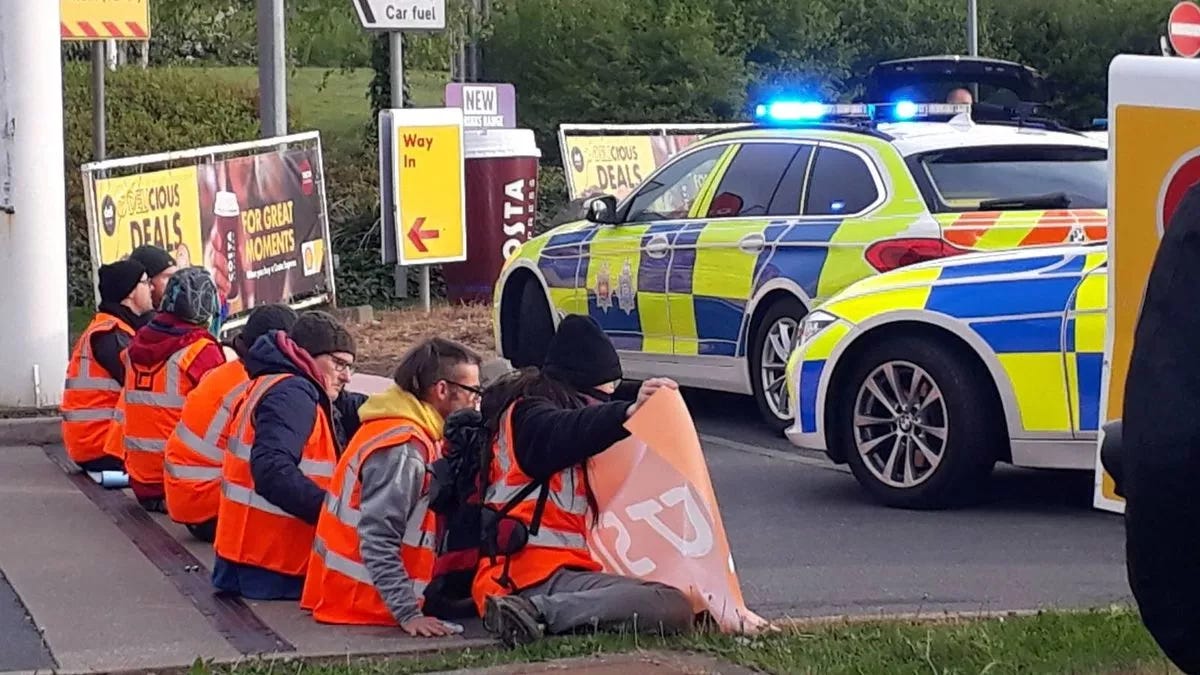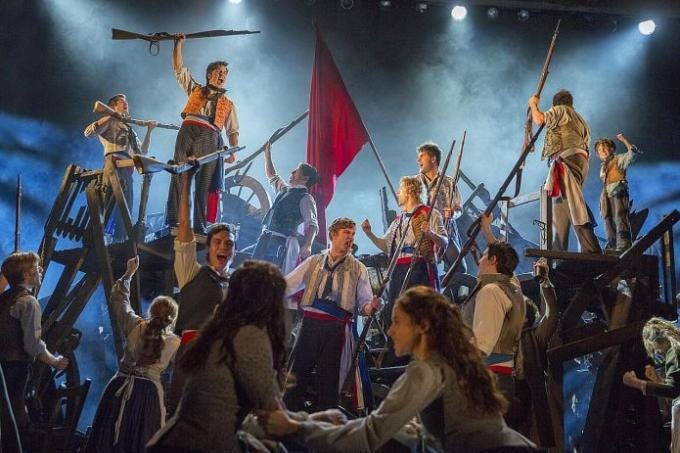Just Stop Oil Stops The Show (and Some Theatre Folk Forget History)
When protestors took to the stage during Act One of Les Mis, stopping the show, some theatre people forgot theatre's important place in politics
Thank you for reading the JasonWard Creative Substack. I hope you enjoy this week’s piece about the importance of politics in theatre and theatre in politics. This substack is a reader supported publication which is easy to support by taking out a subscription and enjoying over 70 articles, podcasts and playlists which range from interviews and reviews to creative insights, advice and whatever other random creative thoughts spring to my mind with updates at least once a week.
Subscription is free of charge and I would love to welcome you to our ever growing creative community.
Us theatre lovers are complicated! We fight for the right to express ourselves as we are and to tell the stories that need to be told. We hold to our beliefs (by and large) and we are really great communicators which means that if something pisses us off we are also very good at letting the world know about it. Theatre is both a wonderful art form and a voice of protest - so why did so many of the theaterati lose their collective shit when five Just Stop Oil protestors stopped a performance of Les Misérables this week?
To be fair if I had paid top dollar to see a 40 year old West End show about 19th century student revolutionaries and it got stopped by 21st century student revolutionaries, I would probably be pissed off too! And I do not underestimate the fear that the cast must have felt upon turning round to see orange flags waving downstage, and a group of randoms locking themselves to the stage. This moment of cognitive dissonance is frightening and disorienting which you can see on the many cellphone videos posted online. The cast continue to perform for several seconds seemingly unable to make sense of the situation before being calmly led off the stage by an incredible stage management team. Some audience members can be heard shouting “get a job” although it is not clear if this is aimed at the real life Just Stop Oil protestors on the stage or the fictional student protestors in the show! This is the point where immersive and traditional theatre met and Secret Cinema could not have done it any better!
The response on social media from some of the theaterati has been extraordinary! I have changed some names and details to protect people’s privacy (and pride): “how dare protestors climb on our stage to stop our show about protest” tweeted by jvjean24601. While cammack46 furiously posted a“wanted for crimes against theatre” with a photo of the 5 protersters. Self described ‘regular theatre goer’ Geoffrey who has seen Les Mis more than 20 times, called into a London radio phone in to say that ‘Just Stop Oil should just stick to stopping oil rather than stopping London’s greatest ever musical’ . Theatre blogger ShineyWestEndLuv made a TikTok video imploring protestors to think about the dangers of climbing onto a stage during a show “there are moving parts, quick changes, lighting cues, props and all sorts happening which is why we take so long with tech rehearsals. It’s about safety.” Shiney makes a great point because stages are dangerous places but, if you’re a Just Stop Oil protestor who has sat down in traffic on the M25 or caused the organisers of the British Formula One Grand Prix to call in the military, then your sense of danger is going to be different!
But amongst all this outrage, this flicking of fans and clutching of pearls it is easy to wonder where did theatre’s rebellious spirit go? Only two years ago the activist theatre group BP or not BP was staging a protest inside the British Museum against the oil giant’s multimillion pound sponsorship of arts organisations which included funding for the RSC, the Edinburgh Festival and the Royal Opera House. The protest in the museum’s Great Court involved a group of violinists and singers. The Guardian interviewed one of the singers, Vanessa Downie, who said “We always want to raise awareness about BP actively contributing to global warming with its huge appetite for oil and gas extraction” Just two years later are we more concerned with the disruption of a show that has made over $2billion globally than the future of our planet?
Theatre is a political art form and artists have fomented revolution. In musical theatre Les Misérables is one of the least jazz hands shows in existence. Its plot is driven by the political view that the poor in society are treated badly whether at work where they can be fired with no recourse (unless, in this case, they have sex with the boss), in their family life where in order to survive they need to foster out their kids (who are then open to abuse - much like benefits one being paid for two children) or under the law where they are unfairly and disproportionately punished - lead character Jean Val Jean is imprisoned for 19 years for breaking into a house to steal bread. In Victor Hugo’s world it is a church man, The Bishop, who saves Jean Val Jean and sets him on the path of righteousness. He is then tracked for years by Javert who is a working class policeman (“I was born inside a jail”) who seemingly has few other choices but to sell his soul to the ruling class.
As the show develops we see the students start a revolution aimed at creating a fairer society. They are armed and employ civil disobedience tactics - building a barricade in the street - and are brutally cut down by the forces of the state who use live ammunition and artillery on the protest even killing children who get in their way.
Plus ca change as the writers might have said. We still have extreme poverty in rich countries, young people are (thankfully) still protesting about the destruction of their future, and the forces of the state are given ever more powers to restrict the citizenry. As American political activist Upton Sinclair wrote about Les Misérables:
“so long as the three problems of the age—the degradation of man by poverty, the ruin of women by starvation, and the dwarfing of childhood by physical and spiritual night—are not solved; so long as, in certain regions, social asphyxia shall be possible; in other words, and from a yet more extended point of view, so long as ignorance and misery remain on earth, books like this (Les Miserables) cannot be useless”
Theatre is a natural arena for political action. There is the extreme, such as the assassination of President Lincoln in Ford’s Theatre in 1865 by John Wilkes Booth to the more mellow but just as direct appeal to Vice President Mike Pence by the cast of Hamilton in 2016 to stop supporting Trump’s racist and divisive politics (see below). Hamilton is a political piece about a politician that forces us to consider an alternative view of society. Lincoln’s assassin, Booth, is one of the characters in Sondheim’s show Assassins about political violence and the 13 people that killed (or attempted to kill) US Presidents. In both shows politics and political violence are examined.
Theatre, especially in London and New York, can sometimes get a little high on its own rarified air supply and forget that it is an important part of the real world. There is no denying that, in the moment, the Just Stop Oil protests were frightening and disorienting. In much the same way that Mike Pence’s security team probably got very twitchy when the Hamilton cast broke the fourth wall and addressed the VP directly, putting Pence literally in a spotlight in a very tight situation. Both events were ultimately non-threatening and made a great point but were disruptive and not part of the show.
Protest is disruptive, the student protestors in Les Misérables disrupted life in Paris. I have watched shows in London that have been disrupted by drunks, by technical challenges and even, during The Prince of Egypt, by the Metropolitan Police who walked down the centre aisle told everyone to stay calm and asked if “Rachel from high Wycombe” was in the house. Yes we all had a moment of fear because the Police intervention was unexpected, previously unexplained and unusual. And once again I do not want to downplay the fear that the cast, crew, staff and audience must have felt in the moments that passed as the protest began. But it is also instructive to see that the audience did not ‘stand up and fight’ but remained calm. This is in contrast to much of the reaction that informed our immediate view of the event which is based on instant and emotional responses to it on social media.
If you watch the videos of the Just Stop Oil protest you will see a disruptive but peaceful protest that ends with the protestors apparently joining the audience in a round of ‘Do You Hear The People Sing” with an enthusiastic audience member conducting! (video below from Just Stop Oil Twitter/X Feed)
Just Stop Oil are making a valid point about the future of the earth in the same way that Les Misérables makes valid points about inequality and inequity in society. The movement that led to the writing of Les Misérables started as a fight for social justice with similar tactics to Just Stop Oil. It was a threat to the ruling classes. So while we clutch our pearls at the desecration of our beloved theatre by these grubby eco-zealots (wow I could get a job with Daily Fail!) we should remember that in the US in living memory creatives were rounded up by McCarthy and stopped from working because their views were deemed communist. Up until 1968 the Lord Chamberlain’s office in Britain was the official theatre censor which closed down plays and even prosecuted the Royal Court Theatre - this is in living memory.
Protest and free expression are essential parts of theatre and the arts. While we don’t want our musicals, plays and exhibitions disrupted we need to be careful as creatives and as audience member, with how much we challenge freedom of expression I think journalist Holly Thomas puts it really well in this tweet:
“The Just Stop Oil Les Mis demo is objectively smart, sorry! Can't be all "do you hear the people sing" then tell the IRL protesters to eff off so you can enjoy your bougie evening at the theatre!”
Thank you for reading this week’s piece on the Jason Ward Creative Substack. To gain access to weekly content like this as well as podcasts and playlists, please take out a subscription - which is currently free of charge!
And if you think other people should read this piece then please feel free to share it far and wide
FOOTNOTE:
To book tickets for Les Miserables anywhere in the world please click here:
To find out more about Just Stop Oil please click here:









Yes, theatre (and all art) is revolutionary but it is also generally voluntary -- the choice of the audience to participate is what turns the witness and the artist into collaborators for a cause. As with most things in life, consent is key. What Just Stop Oil has done is to impose itself on other people's time and attention. In this instance, they disrupted the show so badly that it could not be completed. Anybody who traveled to see the show and who can't return is just out of luck.
But, you might say, Just Stop Oil's cause is important! But it is one important cause among many in a complicated world and one thing I believe very firmly is that everybody has the right to their priorities. for Just Stop Oil, ending fossil fuel production is the most important thing. To me, that's not even the most important aspect of dealing with climate change and, I know this is controversial, climate change is not top of my list of social/political/aesthetic issues that need the most urgent address. We don't have to agree on that. The point is, you have the right to your priorities and I have the right to mine.
Actions like this infringe on people's right to decide for themselves what's important. It's intrusive narcissicism, which is the nicest way I can think to put it.